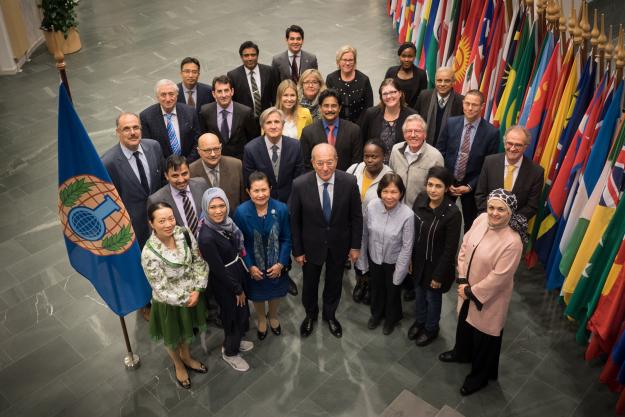
Participants of the Green and Sustainable Chemistry workshop
THE HAGUE, Netherlands — 24 November 2017 — Participants of the Green and Sustainable Chemistry workshop, hosted by the Organisation for the Prohibition of Chemical Weapons (OPCW) in The Hague, the Netherlands from 16-17 November, developed recommendations for improving chemical safety and security within industry.
The event was organised by the OPCW in collaboration with the International Council of Chemical Associations (ICCA) and the International Union of Pure and Applied Chemistry (IUPAC). It was attended by representatives from the chemical industry, academics and national authorities from across the globe.
The OPCW Director-General, Ambassador Ahmet Üzümcü, emphasised the relevance of this workshop for the chemical weapons agenda and stated that “promoting the peaceful uses of chemistry and nurturing a culture of safety and security among chemistry professionals is at the heart of the OPCW’s mandate, and constitutes a fundamental element of our work”.
He observed that “as the total elimination of declared stockpiles moves nearer to becoming a reality, the focus of the OPCW will shift from destruction to the prevention of the re-emergence of chemical weapons. Simultaneously, we must continue to promote international cooperation for the peaceful applications of chemistry”.
During the workshop, participants presented their activities in the area of green and sustainable chemistry, including scientific research, education and capacity-building initiatives. They shared thoughts on the avenues of collaboration between science and industry and debated the needs, feasibility and benefits of promoting sustainability within the chemical industry. They underlined the potential for the OPCW’s pivotal role in providing assistance to mitigate the risks caused by the use of toxic chemicals in industry, and in ensuring high-quality life-cycle analysis of chemical products.
Background
As the implementing body for the Chemical Weapons Convention, the OPCW oversees the global endeavour to permanently eliminate chemical weapons. Since the Convention’s entry into force in 1997 – with its 192 States Parties – it is the most successful disarmament treaty eliminating an entire class of weapons of mass destruction.
Ninety-six per cent of all chemical weapon stockpiles declared by possessor States have been destroyed under OPCW verification. For its extensive efforts in eliminating chemical weapons, the OPCW received the 2013 Nobel Prize for Peace.
